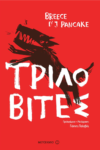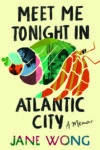 Steven Dunn’s Potted Meat is one of the winners of the great Tarpaulin Sky’s 2015 contest, and it’s out just now. Dunn gets into West Virginia, fragment to fragment, a young boy focalizing a lot of abuse, alcoholism, racial tensions, poverty, and nature, nature. This book has some flowers. It moves with and off of things. It comes from Eileen Myles and Nas and Selah Saterstrom. This is Dunn’s first book; he’s got a BA in creative writing and ten years in the navy. I need his thoughts on plot (they’re in here): “I prefer the other definitions of plot, like a burial plot or garden plot: a space to excavate, grieve, cultivate, construct, or whatever types of work has to be done there.” We talked about a few things including a mutual favorite album, Illmatic.
Steven Dunn’s Potted Meat is one of the winners of the great Tarpaulin Sky’s 2015 contest, and it’s out just now. Dunn gets into West Virginia, fragment to fragment, a young boy focalizing a lot of abuse, alcoholism, racial tensions, poverty, and nature, nature. This book has some flowers. It moves with and off of things. It comes from Eileen Myles and Nas and Selah Saterstrom. This is Dunn’s first book; he’s got a BA in creative writing and ten years in the navy. I need his thoughts on plot (they’re in here): “I prefer the other definitions of plot, like a burial plot or garden plot: a space to excavate, grieve, cultivate, construct, or whatever types of work has to be done there.” We talked about a few things including a mutual favorite album, Illmatic.
[This piece originally appeared in the Full Stop Quarterly Issue #3. The Quarterly is available to download or subscribe here.]
Caren Beilin: Potted Meat feels like a first book that is someone’s whole life — not autobiographically, but their whole writer’s mind, like full of every twinging sensation and ribbon up to now. The fragments move and make and do so quickly, with an alacrity that a whole everything seems to be with. This is my sensation when reading, does this at all resonate for you? Or why is this book, from what?
Steven Dunn: Yes. This does resonate with me, especially since you say “sensation” and “ribbon” in relation to the fragments, which I think speak to a kind of movement. I wrote with ideas from Eileen Myles’ Inferno, where she says about narrative, to “pick points along the swirling line almost like a constellation that would simply indicate the movement without representing every little bit.” She also says, “I start with a problem and I keep returning the feeling of it, not the idea.” So I think those two ideas are the sensations and ribbons, and the swirl returns to and departs from certain feelings while indicating a whole without pretending to be whole. And rap albums are also wonderful for doing that, maybe because of the form. I’d been living with Nas’ Illmatic in my body for a long time, and there is this urgency about a specific place, some type of energy swirling throughout that knows it can’t say everything but wants to say enough. Like Nas captured the energy of his New York, I wanted to capture the energy of my West Virginia.
Ok, fragments. Fragments seem helpful in the way they can resist a narrative arc that urges a character or characters to learn something or come to conclusions or come of age, awaken, that shit. Potted Meat is described as “follow[ing] a young boy into adolescence.” Did you feel, in writing this, that you were writing against a kind of coming of age story? And if so, where does this resistance, for you, come from?
Before, I tried to put this story in the conventional-story-arc-form (because that’s what I thought a book was supposed to look like). But it didn’t feel right, so I think the story itself was resisting. What I learned from Selah Saterstrom, was that stories/projects come with their own instructions, and it is the writer’s job to listen. Fortunately, I finally got to a place where I was able to listen to the story on its terms, and write it in a way that felt right and honored its disjunctions, silences, and uncertainties. I guess I also resist in the way that I prefer the other definitions of plot, like a burial plot or garden plot: a space to excavate, grieve, cultivate, construct, or whatever types of work has to be done there.
Something that so immediately sparks my energies as a reader, when I’m reading these, is this sort of metaphysical reverie some of the fragments slide right into, like in Happy Little Trees, where the narrator is trying to make paint with world: “Chew coal. Chew red clay. Chew what a grasshopper chews. I chew a grasshopper. Crunchy, then juice squirts to back of throat. The paste is chunky brown green white. Lick off hand and chew until smooth. Open jar, chew lightning bugs. Wait till night when they light, then rip off the ass, smear it on my face.” The blurb for Potted Meat talks about the tensions of being embodied during repeated trauma — I feel like these fragments keep on plugging and plunging into the worldbody, I don’t know, is this your pleasure as a writer? Or what’s the relationship, your relationship, between trauma and nature?
“Plugging and plunging” is spot on! I appreciate that reading. The narrator’s relationship between trauma and nature is that, the trauma is a fixed thing, and could be changed by nothing. So I think that’s where the reverie for nature lies, because it’s always changing, has tender edges, and liminal spaces. It’s a place where the narrator is often alone and can enact change within a changing environment, which is in contrast to the home. But there’s the snap back from nature, like ending Happy Little Trees by ripping the beautiful glow off the bugs, but wanting to keep some it by smearing it on his body. So I guess nature also becomes a known temporary relief from the home/trauma, hence the desperation of plugging and plunging. But throughout the book, nature changes: The narrator shoots and guts a groundhog, kills a snake, smokes poison ivy. He works on a trash truck and sees severed deer legs and dead kittens. But even in these more violent fragments, the reverie for nature is still there, sort of like staring at a stained glass depiction of the Crucifixion. And as a person, I am in love with the landscape of West Virginia (it feels old and fertile and has its own logic) so that certainly is a pleasure of mine as a writer, and I sometimes write it to try to understand it.
Can you maybe say more about the form of Illmatic? Like, why is that album so special? It has an aura around it I think. Why do you think it’s been living in your body like this?
Why I think Illmatic is so special? You mentioned that you think it has an aura around it, and I agree. The album cover is atmospherically immediate (his child face super-imposed on the projects), then the first thing you hear are sounds of trains or subways. You are in that world, in the mess. And before he starts “NY State of Mind,” he says, “Straight out the fuckin dungeons of rap …” Something has bubbled up from this child on the cover about his environment that has to be said, and he just goes in with this breathless urgency that celebrates/criticizes his place. “I’m in the PJs … each block is like a maze / full of black rats trapped …” And that tension is present within and between each song (vignette) on the album. It’s like a whole story!
“Straight out the fuckin dungeons of rap” — dungeons of rap, dungeons of the projects in Queens, but you also describe “Something has bubbled up from his childhood . . . ” Childhood as a kind of dungeon, a bottom? Potted Meat is written from what kinds and how many dungeons?
I love this idea of different kinds of dungeons, especially childhood as a dungeon. Firstly, West Virginia, seems like a state that has disappeared from the nation (economically, educationally, and culturally). And my county, McDowell County, seems to have disappeared from the state (highest unemployment rate and worst public school system, and it’s also geographically the southern-most county.) Then there is the systemic racial disappearance of Black people. And within that, there are personal dungeons like shame, guilt, anger, and abuse. Potted Meat is attempting to speak from all of these layers of disappearance/dungeons. So, that’s 6 major dungeons, but I’m sure there are smaller ones lurking.
Caren Beilin is the author of a novel, The University of Pennsylvania, and some short fictions, Americans, Guests, or Us. She lives in Philadelphia.
This post may contain affiliate links.







